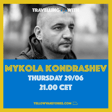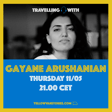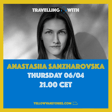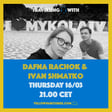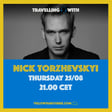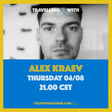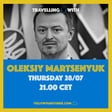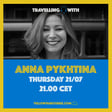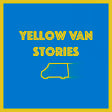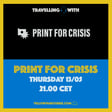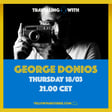
Mariia Ponomarova "Perception Of Strength"
In our first episode of the new season, our guest is film director, screenwriter, and creative producer Mariia Ponomarova (1991, Kyiv). Mariia studied film directing and screenwriting at Karpenko-Karyi Kyiv National University of Theatre, Cinema & Television in Ukraine graduating cum laude in 2013. Focusing on character development in film during her course, Mariia graduated from the Master of Film artistic research program in 2016
at the Netherlands Film Academy. Short fiction and documentary films written and directed by Mariia were screened at such festivals as Sarajevo FF, Vancouver IFF, VIS Vienna Shorts, Netherlands FF, Odesa IFF, CineDOC-Tbilisi, Go Short ISFF, ArtDocfest, Molodist IFF, and others. Mariia's first producer's documentary project 'Fragile Memory' was a part of the Ex-Oriente Film workshop and received pitching prizes at Odesa IFF Film Industry 2018 & 2019, and East Doc Platform 2019. Mariia's directing debut documentary feature 'Nice Ladies' received a B2Bdoc Pithing Award at Producers Meet Producers. Mariia's works capture the rich cultural heritage of Ukraine, and, like a sculptor chipping away at a block of marble, she reveals the essence of Ukrainian identity, always present, but invisible to the untrained eye. She lives and works in Amsterdam visiting Ukraine for her film projects on a regular basis. And today she is with us in the Yellow Van and I couldn't be happier that she could find the time.
Welcome to the Yellow Van, Mariia!
MARIIA'S WORKS
ponomarova.com
Ardea
May 9th
Family Hour
Fragile Memory
Nice Ladies
TOPICS
The Fall Of Lenin, Ukraine 2017, Svitlana Shimko
Olia Hercules, Ukrainian-British cookbook author
Dziga Vertov, Ukrainian director & camerman
Everything Is Illuminated, USA 2005, written and directed by Liev Schreiber
Killing Eve, TV Series, 2008-2012
The Gulag Archipelago, Soviet Union 1973, Alexandr Solzhenitsyn
What We Got Wrong About Solzhenitsyn, 2022, Essay by Blake Smith
Svetlana Alexievich, Belarusian journalist and author
Nikolai Amosov
On Photography, USA 1977, Susan Sontag
Takflix
INITIATIVES TO SUPPORT
Docu Help
Come Back Alive Foundation
100 Drones Organisation
MUSIC
Love In The Face Of Fear, Jim Kroft
Yellow Va
Yellow Van Stories is a


